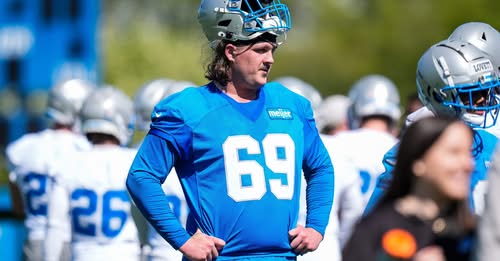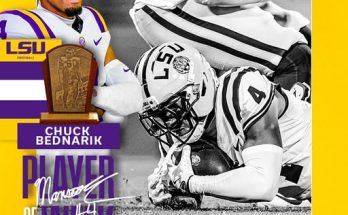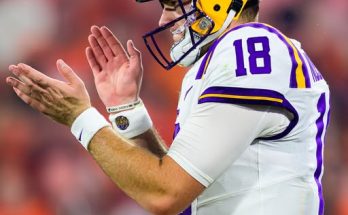The Detroit Lions entered the 2024 NFL Draft with a clear mission: to bolster their offensive line and ensure long-term stability in the trenches. Tate Ratledge, a highly touted guard out of Georgia, seemed like the perfect fit—a mauler in the run game with the athleticism to hold his own in pass protection. When the Lions selected him in the third round, many analysts praised the pick, projecting him as a potential Day 1 starter. However, what should have been the beginning of a promising career has quickly turned into a contentious standoff. Ratledge’s decision to hold out for a better contract could backfire spectacularly, leaving him with regrets that extend far beyond his rookie season.
Holdouts are nothing new in the NFL, but they rarely end well for rookies—especially those drafted outside the first round. The current collective bargaining agreement (CBA) has largely eliminated lengthy holdouts by implementing a strict rookie wage scale, which leaves little room for negotiation. First-round picks have some leverage due to the fifth-year option, but for Day 2 and Day 3 selections like Ratledge, the system is designed to limit their bargaining power. By refusing to sign his contract, Ratledge isn’t just missing valuable reps in training camp; he’s risking his standing within the organization before he even steps onto the field.
One of the biggest pitfalls of Ratledge’s holdout is the missed opportunity to establish himself early. The Lions’ offensive line is already stacked with talent, including Pro Bowl center Frank Ragnow and standout tackle Penei Sewell. But there’s still competition at guard, and Ratledge had a legitimate chance to win a starting job. Now, every day he spends away from the facility is a day another player—perhaps a late-round pick or undrafted free agent—gains the trust of the coaching staff. Head coach Dan Campbell has built a culture in Detroit that values toughness, accountability, and team-first mentality. A holdout, no matter the reason, flies in the face of those principles. If Ratledge thinks the Lions will simply hand him a starting role once he finally signs, he’s in for a rude awakening.
Beyond the immediate competition, Ratledge is also missing critical development time. Rookie offensive linemen face a steep learning curve when transitioning from college to the NFL. The speed, complexity, and physicality of the game are on another level, and the only way to adapt is through repetition. Training camp isn’t just about earning a job—it’s about refining technique, building chemistry with teammates, and learning the playbook inside and out. By sitting out, Ratledge is putting himself at a severe disadvantage. Even if he eventually signs and reports, he’ll be playing catch-up while his peers are already hitting their stride. This could lead to a slow start, which might then snowball into reduced playing time or even a redshirt year. For a player who was drafted to contribute immediately, that’s a worst-case scenario.
Financial considerations are undoubtedly at the heart of Ratledge’s holdout, but here, too, his strategy may be flawed. The rookie wage scale ensures that third-round picks sign relatively modest contracts, with little wiggle room for negotiation. The difference between what Ratledge is reportedly seeking and what the Lions are offering is likely negligible in the grand scheme of an NFL career. By holding out, he’s forfeiting signing bonus money and potentially incurring fines, which only eats into his earnings. More importantly, he’s delaying the clock on his career. If he misses regular-season games due to his holdout, he’ll lose game checks, and his path to a lucrative second contract—the real payday for most NFL players—gets pushed back. Given the short shelf life of professional athletes, every missed game is a missed opportunity to prove his worth.
The Lions, for their part, have shown little indication that they’re willing to budge. General Manager Brad Holmes has built a roster that doesn’t rely on any single rookie, and the team’s recent success means they’re under no pressure to cave to Ratledge’s demands. If anything, the Lions have a history of moving on from players who don’t buy into their culture. Remember, this is an organization that traded former first-round pick Jeff Okudah after just three seasons, in part because he never fully meshed with the team’s identity. Ratledge, as a third-round pick, has far less leverage than Okudah did. If this holdout drags on, the Lions could easily decide to cut their losses and focus on developing other young linemen.
There’s also the broader perception around the league to consider. NFL teams talk, and a player who holds out as a rookie—especially one without the pedigree of a first-round pick—risks being labeled as difficult or entitled. That reputation can follow a player throughout his career, affecting future contract negotiations and even his chances of landing with another team if things don’t work out in Detroit. Ratledge may believe he’s fighting for what he’s worth, but front offices often view holdouts as a red flag, particularly when the player hasn’t yet proven anything at the professional level.
Perhaps the most frustrating aspect of Ratledge’s holdout is that it undermines what should be an exciting and optimistic start to his NFL journey. The Lions are one of the league’s most ascending teams, coming off a deep playoff run and positioned as legitimate Super Bowl contenders. The offensive line is a cornerstone of their success, and Ratledge could have been a key piece of that foundation. Instead of embracing the opportunity to learn from veterans and contribute to a winning culture, he’s locked in a financial dispute that benefits no one. Even if he eventually gets the extra money he’s seeking, it may come at the cost of his relationship with the team and his own development.
History is littered with examples of rookie holdouts that backfired. Joey Bosa’s 2016 holdout with the Chargers led to a hamstring injury and a slow start to his career. Melvin Gordon missed the first two games of his rookie season due to a contract dispute and later admitted he regretted the decision. More recently, 49ers wide receiver Brandon Aiyuk’s early-career holdout created unnecessary tension before he ultimately signed his rookie deal. In each case, the player lost valuable time, and the financial gains were minimal compared to the long-term consequences. Ratledge would be wise to learn from these cautionary tales.
The reality is that Tate Ratledge’s best path to a big payday is through performance, not negotiation. If he proves himself as a reliable starter, his second contract will dwarf anything he could gain from holding out now. The Lions have shown they’re willing to reward homegrown talent—see the massive extensions for Ragnow, Sewell, and Amon-Ra St. Brown. But those players earned their money by producing on the field and buying into the system. Ratledge’s current approach suggests he’s prioritizing short-term gains over long-term success, and that’s a gamble that rarely pays off in the NFL.
In the end, Ratledge may find that the money he’s fighting for now pales in comparison to what he stands to lose. A delayed start to his career could mean fewer snaps, slower development, and a tarnished reputation—all of which would hurt his earning potential down the line. The Lions have built something special in Detroit, and Ratledge was supposed to be part of that. Instead, his holdout threatens to derail his career before it even begins. If he doesn’t change course soon, he may look back on this decision as the moment he let pride get in the way of progress. And by then, it could be too late.



